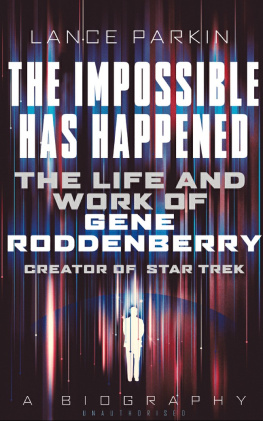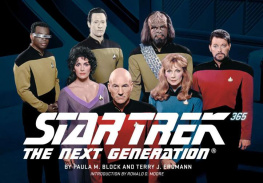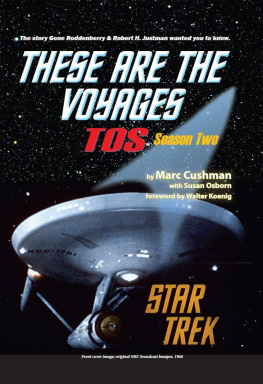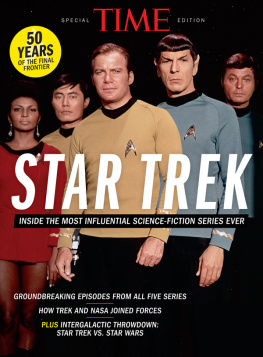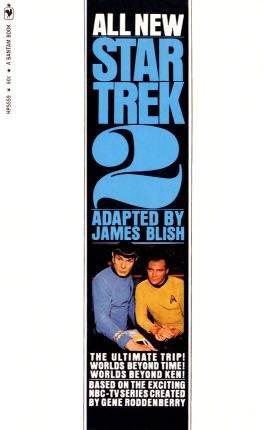Beware of getting too wrapped up in The Wonder Of It All. The quality of a SF tale is usually inversely proportionate to the pretension a writer brings to it.
G ene Roddenberry died on October 24, 1991, a few weeks after the twenty-fifth anniversary of the first broadcast of Star Trek. He was only a couple of months past his seventieth birthday, but he had been frail for a long time, and he knew he was dying. His death came at a high water mark for the franchise, when both a hugely popular television series and a very successful series of movies were in production. To celebrate the shows silver anniversary, the TV series Star Trek: The Next Generation aired the two-part story Unification, which brought together Captain Picard and Mr. Spock in a full-scale crossover of the old and new shows. The following month saw the release of Star Trek VI: The Undiscovered Country, a movie designed as a capstone for the adventures of Captain Kirks crew.
Unification and The Undiscovered Country both included a caption dedicating the project to Roddenberry. Studio publicity stressed that before his death, the creator of StarTrek had seen the rough edits of both the TV episode and the movie, and had liked what hed seen.
The publicity didnt mention that Roddenberry had long been all but locked out of the running of both the movie series and The Next Generation, and that the notes hed given the production teams had been all but totally ignored. The studio may not have known that, in fact, hed returned from viewing Star Trek VI andforty-eight hours before he diedinstructed his lawyer to start legal action to have fifteen minutes of material cut from the movie.
Gene Roddenberry, the man, polarized people. William Shatner and Leonard Nimoy, who played Captain Kirk and Mr. Spock, quickly fell out with him over business issues or as Shatner put it, He was a chiseler who wanted a cut of outside money his cast earned, demanded to be called master, and prohibited poor Nimoy from using a company pencil. Roddenberry battled substance abuse. He sexually harassed his secretaries, and he didnt just cheat on his wives, he cheated on his mistresses. Despite that, many of his friends, colleagues and family members remained consistently loyal to and protective of him. From the early days of Star Trek until today, there have been fans who treat him, his work, and his memory with a reverence usually reserved for the leaders of revolutions.
In 1994, two hefty biographies of Roddenberry were published: Star Trek Creator by David Alexander, and Gene Roddenberry: The Myth and the Man Behind Star Trek by Joel Engel. The official and unauthorized versions respectively, there are times when they dont seem to be describing the same man. It is possible, as Alexander and Engel demonstrate over and over, to spin the same anecdote to portray Roddenberry as a saint or a monster. One mans money grubbing is another mans fighting for his fair share. An early episode of the original series, The Enemy Within, sees Kirk split into two personalitiesan ineffective, caring type and a scheming, ravenous beast. Its tempting to view Roddenberry as such a Jekyll and Hyde character.
Its clear, though, that Gene Roddenberry was no such thing. His personality was extremely consistent for most of his life; indeed, when he started suffering mood swings a couple of years before his death, those closest to him understood it as a symptom of his failing health. You can refuse to compromise your principles and be a boorish, hypocritical jerk.
The fiftieth anniversary marks the point where Star Trek has run longer since Gene Roddenberrys death than while he was alive. Six Star Trek movies were made in his lifetime; seven have now been made since his death. In terms of television episodes, that milestone was passed nearly twenty years ago. Star Trek has lasted so long that we can now watch the series on devices that make Kirk and Picards computers and personal communication devices look rather clunky.
Three television seriesStar Trek: Deep Space Nine (19939), Star Trek: Voyager (19952001), and Star Trek: Enterprise (20015) have come and gone, as have four movies featuring the Star Trek: The Next Generation cast (19942002). In 2009, the movie series was relaunched with an (almost) all-new cast playing Kirk, Spock, and company. The three movies Star Trek (2009), Star Trek Into Darkness (2013), and Star Trek Beyond (2016)have made a great deal of money at the box office. And 2017 will see a new Star Trek television series. While plenty of Sixties shows have been revived, rebooted, or relaunched, on television or for the cinema, its hard to think of another American TV show with anything like the enduring appeal of Star Trek. Its hard to say which show even comes second.
One candidate is Mission: Impossible. The comparison was not flattering for Star Trek at first. In many ways, they were sister shows. They were made by the same studio, Desilu Star Trek on sound stages 8 and 9, Mission: Impossible on stages 6 and 7; their production offices were both in the E building, Star Treks on the first floor, Mission: Impossibles upstairs on the second. They debuted the same month (September 1966). According to one studio executive Mission: Impossible got four times as many viewers. self-destructing tapes. Your mission, if you choose to accept it is a catchphrase thats seeped into the popular consciousness. The show was revived for television in the Eighties, and more successfully, of course, as a film series starring Tom Cruise thats now run for twenty years and counting (1996).
Clearly, though, Star Trek has had a more successful afterlife. So why did Star Trek, out of all the American TV shows of the Sixties, become such a phenomenon? And where does Gene Roddenberry figure in the answer to that question?
When they describe the show, Star Trek fans occasionally drift into a parallel universe where it was the only show that dared to tackle social issues or other difficult topics, had a multi-racial cast, inspired a devoted fan following, or was revived due to public demand. Gene Roddenberry encouraged people to think Star Trek always stood out, but this is clearly untrue. The root of Star Treks success is that on a week-by-week basis, it delivered some really good episodes of television, ones that many people can rewatch almost endlessly.
Every artistic venture thats the work of many hands generates arguments about what the magic ingredients were, and who deserves credit for coming up with them. Gene Roddenberry would portray himself, at times, as the sole creative force on Star Trek. But some of the most popular things about Star Trek happened despite Roddenberry, not because of him. He was frequently frustrated when directors like Nicholas Meyer, or actors like William Shatner or
The very least generous assessment of Roddenberrys contribution, though, is that he created the basic framework for Star Trek, and then was a key member of the team of writers, directors, actors, artists, and designers, assembled by himself, who brilliantly and efficiently established a memorable future of primary colors, beautiful women, bizarre creatures, and big ideas.

